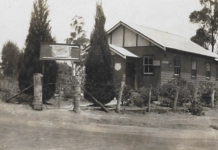
I was raised in a Christian home and my parents were very in Christian worship and service. Most of my schooling was at Tyndale Christian School, Blacktown. At the age of twelve I made a decision to follow Christ as my Lord and Saviour, and was baptised by immersion at Doonside Church of Christ. As I look back on my life I have no doubt about the genuineness of that decision and of the working of the Holy Spirit in my heart and mind.
In my teenage years I struggled with my commitment and life in general. I became unsettled due to some problems at home and personal difficulties. When I was sixteen I attended Christian City Church Brookvale, and made a fresh commitment to discipleship to Jesus Christ.
Whilst at school I had a real sense of a call from God to pastoral ministry. At eighteen I became heavily involved in church planting, and have been in Christian ministry ever since (I’ve been in Christian ministry now for 27 years). I currently serve as the Vice Principal (Communications) of Morling Baptist Theological College.
The various stages of my faith journey have been about following God’s call. A call that is consistently a result of prayer and studying God’s Word. It has lead me into church planting, pastoral ministry, and teaching at Morling College.
My passion is the Lord Jesus Christ and my simple desire is know the power of his resurrection and the fellowship of sharing in his sufferings (Philippians 3:10-11). This passion and desire has shaped my 27 years of Christian ministry.
Finding help during times of struggle
But it hasn’t all been rosy. Throughout my ministry I’ve struggled with varying degrees of depression. Most of the time it’s a low-grade depression and easily managed. Sometimes it’s more significant. This depression comes and goes, but lately it hasn’t been so frequent. A book that’s really helped me is Arch Hart’s Dark Clouds – Silver Linings. It gave me a helpful introduction to the nature, causes, symptoms, management, and healing of depression, and helped me work out where to get help for depression in ministry. I now understand that there are various types of depression. These categories helped me to perceive the various sources of depressions in my life, and which of these forms of depression have afflicted me in the past.
 I’ve found encouragement and comfort in the following truths: Depression has afflicted men and women of God throughout biblical times and contemporary history, therefore, Christians aren’t failures or unspiritual when they face the reality of depression! Over-spiritualisation of depression is wrong, simplistic, and unscriptural. Therefore we don’t have to feel condemned by some contemporary “Christian” teachings on depression, when we’re struggling. Although depression may at times be the consequence of sin, there is legitimate depression that occurs as a natural response to loss—therefore we don’t have to feel condemned, guilty, or ashamed when feelings of depression confront us. The guilt that we feel is often self-imposed and unmerited. We don’t have to feel guilt when we’re depressed! Knowing this helps to prevent our depression from spiralling deeper and compounding into an exaggerate depressive reaction— that is, a major depression. We can allow seasons of depression to drive us toward our ultimate source of recovery, comfort, and strength—Jesus Christ. As we renew our minds and conform our thinking to the thoughts of God—as expressed in Scriptures—depressions need not be as frequent or as long lasting. And finally, there is no shame in seeking professional help during times of depression—because professionals, especially Christian professionals, can be used by God in the recovery process of healing depression. When we cooperate with God’s healing presence in the midst of our depression, we find that depression can be a healthy response, even a healing emotion. For example, when depression alerts us to a sense of loss or grief that we’re experiencing, we can detach from the thing or person lost in a healthy fashion. We can grieve in a healing way. We can turn to God and others for the resources we need for complete recovery and health.
I’ve found encouragement and comfort in the following truths: Depression has afflicted men and women of God throughout biblical times and contemporary history, therefore, Christians aren’t failures or unspiritual when they face the reality of depression! Over-spiritualisation of depression is wrong, simplistic, and unscriptural. Therefore we don’t have to feel condemned by some contemporary “Christian” teachings on depression, when we’re struggling. Although depression may at times be the consequence of sin, there is legitimate depression that occurs as a natural response to loss—therefore we don’t have to feel condemned, guilty, or ashamed when feelings of depression confront us. The guilt that we feel is often self-imposed and unmerited. We don’t have to feel guilt when we’re depressed! Knowing this helps to prevent our depression from spiralling deeper and compounding into an exaggerate depressive reaction— that is, a major depression. We can allow seasons of depression to drive us toward our ultimate source of recovery, comfort, and strength—Jesus Christ. As we renew our minds and conform our thinking to the thoughts of God—as expressed in Scriptures—depressions need not be as frequent or as long lasting. And finally, there is no shame in seeking professional help during times of depression—because professionals, especially Christian professionals, can be used by God in the recovery process of healing depression. When we cooperate with God’s healing presence in the midst of our depression, we find that depression can be a healthy response, even a healing emotion. For example, when depression alerts us to a sense of loss or grief that we’re experiencing, we can detach from the thing or person lost in a healthy fashion. We can grieve in a healing way. We can turn to God and others for the resources we need for complete recovery and health.
As a result of these struggles, I’ve tried to be intentional about developing my emotional and relational and spiritual resources. I’ve tried to foster a vital relationship with God, through spiritual practices (that I describe later), and especially through devotional reading and prayer. Devotional reading for me consists of reading the Scriptures, or books that edify me personally and spiritually. During this reading time I am endeavouring to focus not only on my spiritual growth, but also on my personal growth. I also read biographies and autobiographies of great Christians who suffered with depression throughout their lives—people like Luther, Spurgeon, Calvin, and Wesley. Spurgeon’s writings on depression have been particularly inspirational, since they are concise, accurate, and encouraging. They were written by a great man of God who wrestled with depressions, and still made a huge difference for the mission and gospel of Jesus Christ.
Embracing servant leadership (Servantship)
The passion for ministry and the struggles with depression that I’ve described above, have compelled me to reshape three things:
- My approach to Christian ministry, so that it’s focused on servant leadership
- My approach to maintaining vitality in my relationship with Jesus
- My approach to learning from the whole Church (local and global)
I’ll start with discussing how I’m reshaping my approach to Christian ministry and service.
Lately, I’ve tried to reconceive leadership as servantship. This shift involves allowing a theology of servant leadership—and of the church and its participation in God’s mission in the world—to shape my understanding of the nature and practices of Christian servant leadership (servantship).
 Here’s my definition of servantship (which I unpack in my second book, called “Servantship”):
Here’s my definition of servantship (which I unpack in my second book, called “Servantship”):
Servantship is following Jesus Christ, the servant Lord, and his mission. It’s a life of discipleship to him. It’s patterned after his self-emptying, humility, sacrifice, love, values, and mission. Servantship is humbly valuing others more than yourself. It’s looking out for the interests and wellbeing of others. Servantship is the cultivation of the same attitude of mind as that of Christ Jesus. It’s making yourself nothing. It’s being a servant and humbling yourself. And it’s submitting yourself to the will and purposes of the triune God. Since servantship is the imitation of Christ, it involves an unreserved participation in his mission. Servantship recognises in word and thought and deed that Christian leaders are servants. “Whoever wants to become great among you must be your servant, and whoever wants to be first must be your slave— just as the Son of Man did not come to be served, but to serve, and to give his life as a ransom for many.” (Matthew 20:26–28).
Servantship stands in contrast to many of the leadership principles and practices of the global political and corporate age. Christians shape their servantship after the humility and sacrifice and values of the suffering servant, Jesus Christ. We need a servantship formed by the imitation of Jesus Christ. We show this servantship through a lifestyle of service. We shape a life of servantship through love, hope, faith, and self-sacrifice. “Whoever would be great among you must be your servant.” Servantship is the imitation of Jesus Christ. It is imitation through love and service. Servantship does not dismiss notions of leadership or servant leadership altogether. But it does evaluate and reshape these concepts. It examines and reconceives notions of power and authority and influence. Jesus re-conceives status in the kingdom of God as bonded service. The metaphor of servanthood—and the servant mission and ministry of Jesus—must shape our practices of Christian servantship. Only then will it be Jesus-centred and outwardly focused Christian servantship.
In Philippians 2:7, we read that Jesus “made himself nothing.” He “emptied himself.” True Christian service is movement away from selfish ambition and pride and selfcenteredness. Such service is movement toward the same attitude as that of Jesus Christ. It’s emptying oneself of pride, status, and control over others. It’s being a servant. And it’s humbling oneself. Self-emptied discipleship is submission to the love and will and mission of God. We practice and reveal servantship through love. And it must be the kind of love demonstrated in the Incarnation and at the Cross. Servantship isn’t an abstract or idealised love. It’s concrete and embodied and tangible love.
How do we move toward servantship? By reflecting theologically on Scripture. And by meditating on passages like Philippians 2, and on the four Gospels. And by putting our biblical observations and convictions into practice. The Scriptures push us away from control to service, from competition to love, from a scarcity mind-set to a generous spirit, from pride to humility, from ambition to self-denial, from drivenness to servanthood, from ego strength to interdependent vigour, and from identification with the powerful to fellowship with the broken and marginalised. These are the practices and perspectives of Christian servantship.
Maintaining vitality in our relationship with Jesus
I’m not just reorienting my approach to Christian ministry. I’m also seeking ways to stay vital in my relationship with Jesus (first as a disciple of Jesus, and secondly as a Christian leader).
Spiritual leadership has distinct qualities. And it cultivates certain practices that make it unique and keep it animated by the Spirit of Christ. These include:
- Commitment to the supremacy of Christ and his gospel;
- Identification with people (especially the broken, vulnerable, suffering, and poor);
- Empowerment by the Spirit (the Spirit gives power and fullness for service);
- Retreating from activity (for times of solitude, prayer, study, and fasting);
- Servantship instead of drivenness, dominance, power, and control (servanthood is a regular theme in his writings);
- Saturation in Scripture (the Scriptures are our authority, strength, security, qualification, and delight);
- Bearing Good News (This is a whole-of-life enterprise, since bearing Good News includes:
- preaching the gospel
- relating to those of other faiths
- witnessing to Jesus Christ in our whole lives
- participating in God’s mission in the world
- sharing the truth in love, and
- engaging in social justice, compassionate service, and community development)
- Growing in relationships and community and teams;
- Building deep spiritual friendships;
- Discipling the next generation of leaders;
- Ministering to the sick, demon-possessed, powerless, oppressed, and silenced;
- Launching disciples into ministry;
- Speaking truth to secular and religious powers;
- Growing through suffering, frustration, pain, grief, and loss;
- Finding spiritual and vocational fulfilment in service and sacrifice and difficulty;
- Cultivating spiritual practices (these include prayer, Bible reading, reading spiritual classics prayerfully, mentoring, journaling, fasting, worshipping in community, prioritising quality time with family, and being on mission with Jesus and his church);
- Understanding prayer to be a source of power in ministry, a prevention to burnout, a spring of spiritual vitality, and “the basic feature of the ministerial life”.
I have arrived at a conviction. I am convinced that we cultivate servantship and spiritual vitality through practices. We outwork these practices individually and in community.
 Learning from the whole church (local and global)
Learning from the whole church (local and global)
Finally, I’ve dedicated myself to learning from the whole church. This includes my local church (Thornleigh Baptist Church). I love being a part of that dynamic, missional, local church.
And it includes learning from all church traditions. In my first book (Salt, Light, and a City), I ask: “What does it mean for the church to be truly missional?” And I seek to answer that question by outlining the thought of 12 leading Christian thinkers. These 12 thinkers are carefully selected from each of the 3 great Christian traditions (Roman Catholic, Eastern Orthodox, Protestant, and Free Church).
And, of course, it involves learning from the global church. In mid 2015, I have a book coming out through Intervarsity Press called GlobalChurch: Reshaping Our Conversation, Renewing Our Mission, Revitalising Our Churches. This book unpacks what Western churches can learn from the churches of Asia, Africa, Latin America, Eastern Europe, First Nations, the Middle East, and indigenous cultures. By 2025, twothirds of Christians will live outside the West.
To complement my new book GlobalChurch, I have launched the “GlobalChurch Project.” The concept for the “GlobalChurch Project” is simple. During 2015, I’m going to film more than 50 inspiring Asian, African, Latin American, First Nation, and indigenous thinkers/leaders. I’ll be asking what the non-Western churches can teach the West about mission, worship, church, discipleship, theology, and more. These filmed interviews are called the “GlobalChurch Project”, and will reach a global audience. More details about the “GlobalChurch Project” are on my website: www.grahamhillauthor.com/the-globalchurch-project
The Spirit of Christ is doing amazing things in the world today. And, like many others, I’m seeking to partner with him, by focusing on servantship, cultivating spiritual vitality, and learning from the local and global church.



































